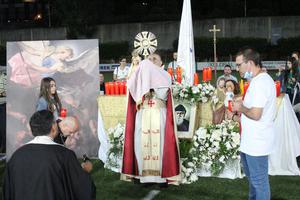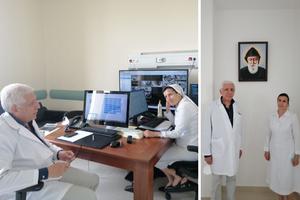‘Mother of Light’ Helps Addicts Find Healing and Hope
Maronite Bishop Guy-Paul Noujaim’s nonprofit has aided more than 6,600 Lebanese men and women, both Christian and Muslim, since its founding in 1989.

BEIRUT — When a heroin addict approached Maronite Father Guy-Paul Noujaim, in Sarba, Lebanon, asking for help, the priest gathered a small team of laypeople, including some of the addict’s friends, to commit to saving the young man’s life.
They pitched a tent in the mountains overlooking the Bay of Jounieh, not far from Our Lady of Lebanon Shrine in Harissa, to offer intensive round-the-clock support and encouragement to overcome his addiction.
The impromptu rehabilitation camp was a success, and, soon, more addicts requested the priest’s help.
That was in 1989. Soon after, he was appointed bishop and officially established Oum El Nour (“Mother of Light”) as a Lebanese nongovernmental organization to focus on both drug rehabilitation and drug prevention.
Oum El Nour has continued to bear fruit and now includes a team of 90 members and 20 volunteers. In 28 years, it has helped more than 6,600 young men and women struggling with drug addiction in Lebanon. The organization’s drug-awareness campaigns and prevention programs reach some 20,000 individuals each year, for which it was awarded the “European Drug Prevention Prize” in 2012.
Oum El Nour offers “fraternity, joy and friendship where the addict discovers the happiness of life and to love life and other people,” Bishop Noujaim, bishop emeritus of the Patriarchal Vicariate of Sarba, told the Register of the organization he founded.
Noting that 18 religious confessions coexist in Lebanon, Bishop Noujaim points out that it’s important that all work together. The staff, volunteers and participants are Christian and Muslim. Oum El Nour’s programs are available free of charge to all, regardless of faith.
“We respect the faith of each person, and we encourage each person to respect the other,” he said. Although it is a secular organization, “the spirit is Christian,” he added.
Not only does Oum El Nour represent a title of the Blessed Mother for Christians, it’s also recognized by Muslims, who venerate Mary as the mother of Issa (Jesus), whom Muslims honor as a prophet. For Lebanese, the name Oum El Nour has special significance. In the chapel at the base of Our Lady of Lebanon Shrine — a popular pilgrimage destination for Christians and Muslims alike — stands a life-size carved wooden Oum El Nour statue. In 1954, the statue toured Lebanon, processing through more than 500 villages, with an estimated 1 million people, nearly half the population of the country at that time, greeting Our Lady. Thus, Oum El Nour is “a symbol of Lebanon as an encounter of all, Muslim and Christian,” Bishop Noujaim said.
Oum El Nour has two inpatient rehabilitation centers located in pristine mountain settings 12 miles north of Beirut. The center for young men in Sehaile, situated on 3.5 acres of land offered by the Maronite Catholic patriarchate, has a capacity for 72 residents. The young women’s center in Faqra is situated on nearly 2 acres and has a capacity for 36 residents.
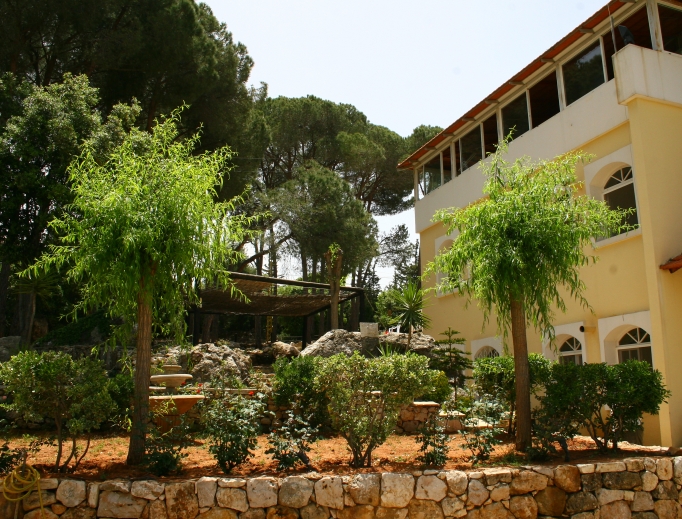
Living as a community, residents follow a schedule that promotes responsibility for daily routines, such as waking up and going to sleep at a required time, making their beds, showering and tidying up their living areas. Rotating chores include preparing meals for the entire group and kitchen cleanup as part of a team. There is a range of meetings and sharing sessions for the residents as well as activities such as art and theater.
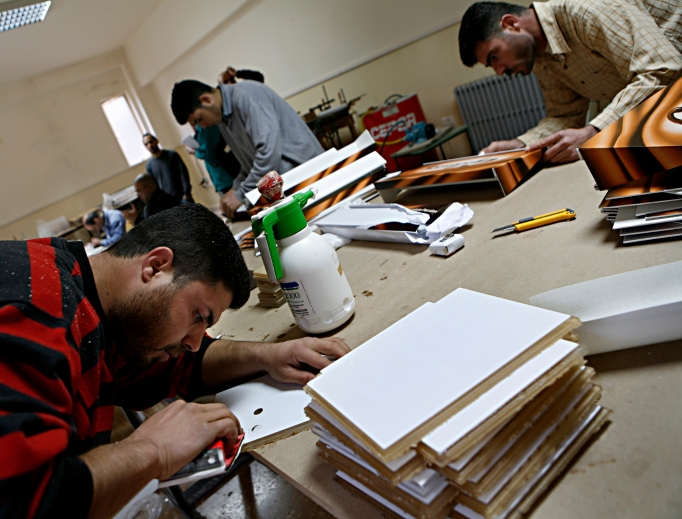
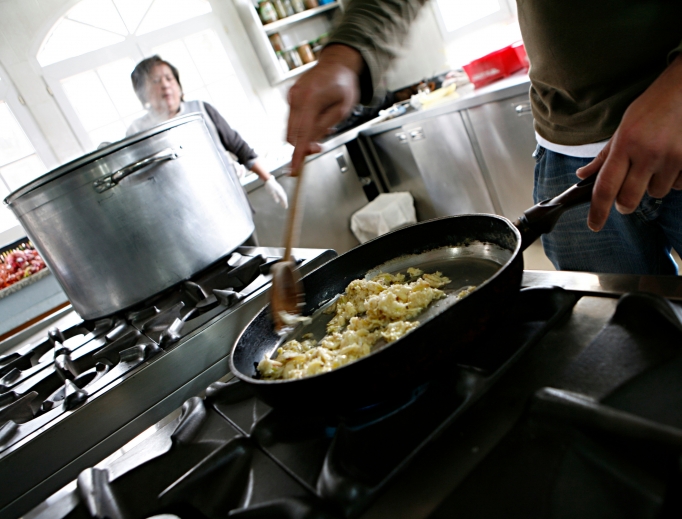
Oum El Nou’s rehabilitation program focuses on four steps: first, helping the addict to become responsible for him or herself; second, instilling responsibility for others; and third, preparing them for reintegration into society. As they progress in their rehabilitation, the residents serve as buddies and mentors to addicts who are newer to the program.
After graduating from and leaving the residential rehabilitation, the former addict is required to participate in Oum El Nour’s follow-up program for a minimum of three years, or as long as needed.
At the heart of Oum El Nour’s approach to rehabilitation is discovering and addressing the underlying issues that led to addiction.
“I think the addict has a bad opinion of himself and of others,” Bishop Noujaim explained. “When he sees that somebody loves him and appreciates him, he begins to love life. Then, slowly, he can go forward in life. This needs time,” he pointed out. The residence rehabilitation program lasts for 15 months, longer if necessary.
For 29-year-old Sassine, now in his 13th month of rehabilitation, low self-esteem was indeed the root of his downfall into drugs. “I always felt like I was a failure to my parents, especially to my father,” he told the Register. Poor communication in his family exacerbated his shyness growing up, he said. In his first year of college, at age 19, Sassine, a Catholic, was introduced to the world of drugs. He started by smoking hashish with some friends. “Everyone was trying it, and it was available,” he recounted. Within a year, he escalated to using heroin. “I used it as a problem-solver, to escape from all my problems at home.” As is typical for most college students in Lebanon, Sassine lived at home and commuted to class, yet he was able to hide his addiction from his parents.
He went from sniffing heroin to shooting up with needles. “I was always searching for the highest of the high.” By the age of 22, he was hooked and couldn’t function without it.
“Lying comes as easily as bread,” he said. “That’s part of the life on drugs: You lose your conscience. There was a time in my addiction when it was more important for me to get the substance than for my mother to go to the doctor,” he said of the times he stole cash from his mother’s purse knowing that she had a doctor’s appointment. (Routine doctor and dentist services in Lebanon are often paid for in cash.)
In fact, Sassine said, for him, the most important sessions at Oum El Nour were those in which he voluntarily and confidentially revealed to his peers and staff the things that he did wrong as a drug user, including stealing from his mother.
Oum El Nour’s environment of “mutual respect, mutual understanding and brotherhood,” Sassine emphasized, helped him to feel comfortable to express himself.
“Now my conscience is awakened,” he said. “And I don’t want to escape my problems. I want to face them head-on.”
As part of his transitional preparation at Oum El Nour, Sassine is attending college again, studying international business. He’s on track to graduate after two more semesters and aspires to have his own business.
“I’ve never been so happy, so confident,” Sassine said, adding that he feels “released from all the chains that held me back.” And his communication with his family is better now, too.
Bishop Noujaim, now 83 years old, has been elected president of Oum El Nour by its board of directors annually since its founding. He continues to be active with the organization, humbly telling the Register, “I encourage them and I pray for them and I am near them.”
Bishop Noujaim was recently invited to lay the first cornerstone for an addiction-treatment center planned by the Shiite Muslim community in a village near Sidon, a predominantly Shiite area in southern Lebanon. “It’s important to work together,” the bishop said. “They ask me for advice,” he added.
One of the biggest challenges for Oum El Nour is fundraising amid Lebanon’s depressed economy. The organization hopes for more donors outside of Lebanon, but over its almost 30 years, the center has continually fostered hope.
The graduation ceremony is a celebratory event, complete with cake and remarks from the graduates and their peers. “The moment of graduation, we feel like we’ve added another person to life,” said Mouhamad Ipo, who serves as a case manager at the men’s center. “We are saving lives here and planting seeds of hope.”
Doreen Abi Raad writes from Beirut, Lebanon.
- Keywords:
- doreen abi raad
- drug addiction
- rehabilitation







